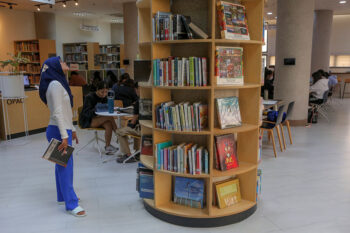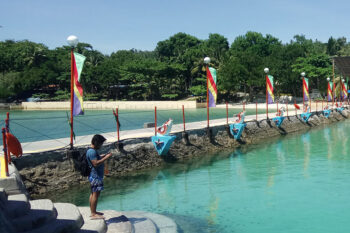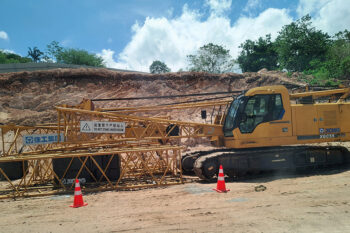1st of two parts
YANGON, Myanmar (MindaNews /11 February) – It’s exactly 20 years back. 1998. February 11. 3:12 am.
“In a few moments, we will land in Mehrabad International Airport,” an IranAir flight attendant in navy blue hijab assured with a smile the drowsy passengers to a seven-hour flight from Kuala Lumpur to Tehran. A score of fellow students from Mindanao and I were fetched by a minibus at the airport and transported to Qazvin, a city over 100 kilometers away. After taking a sumptuous breakfast in Karaj in the suburb of the capital, we arrived in Imam Khomeini International University where we had to learn within six months the language of Gulistan, Divan-e Hafiz, and Shahnameh.
Coincidentally, we arrived in the land of Sa‘di, Hafiz and Firdawsi on the occasion of the victory of the upheaval called by the French postmodernist Michel Foucault “the spirit of a world without spirit”. This upheaval with enduring global impact is believed to be the fulfillment of a prophesy of the Last and Final Messenger (s): “If the religion were at the Pleiades (a cluster of stars), even then a person from Persia would have taken hold of it, or one among the Persian descent would have surely found it.” (Sahih Bukhari, hadith 4518; Sahih Muslim, hadith 4618; Sunan Tirmidhi, hadith 318, 3232, 3868; Musnad Ahmad ibn Hanbal, Part 2, pp. 296, 308, 417, 420, 422, 469)
A more revealing tradition is reported on the authority of a sixth direct descendant of the Prophet (s). Musa ibn Ja‘far whose famous title was “al-Kazim” (one who swallows his anger) said to the effect that a man shall rise in Qum whose name shall be the same with that of the Masih (Messiah) (i.e. “Ruhullah” (name of Imam Khomeini) meaning “Spirit of Allah” which is one of the names of the Holy Christ) and who shall revive the religion.
Now, 40 years after the victory of the Islamic Revolution and the subsequent establishment of the Islamic Republic of Iran, and 20 years after I have personally observed it from a close distance for more than a decade, four enduring challenges, among others, can always be observed facing such a revolutionary-to-ruler transition: (1) simplicity, (2) openness to criticism, (3) loyalty vs. competence, and (4) blaming the enemy.
- Simplicity. Simplicity or simple living which is a moral virtue in the individual’s life is what has been referred to in the Islamic parlance as ‘zuhd’ which oftentimes, in turn, is simplistically translated as ‘asceticism’ with all its negative connotations. Regrettably, the label ‘zahid’ (ascetic) usually gives the impression of a disheveled man, impudent, crowd-evading, anti-social, reclusive, narrow-minded, and idle.
Real ‘zuhd’ (asceticism), however, is a psychological state and a sort of inner freedom. As such, the ascetic is such a master of himself that if he were given the whole world, he would still not lose nor forget himself. A beggar who desires riches as ultimate goal is not an ascetic, but a wealthy man who has no attachment to his wealth is an ascetic.
As simple living from the political perspective is not merely a moral virtue but a political necessity, one can enter the political arena while having no attachment and devotion to materialism, position, and power. Like an experienced mountaineer who wants to climb a summit within one night, the statesman is supposed to only bring in her knapsack, so to speak, the things she will need for one day and one night. A neophyte mountaineer, on the contrary, has this bitter experience time and again of bringing along with her paraphernalia which are more than needed.
It is with this perception that Sayyid Ruhullah Khomeinī regards simple living as a key to political success and honor, saying thus:
“If you want to stand fearless and intrepid against falsehood; to defend the truth; and the superpowers, their advanced weapons, the devils, and their conspiracies not to affect you mentally; and not drive you away from the scene, get yourself accustomed to simple living and refrain from having fondness for riches and position. Most of the great men who have rendered remarkable services to their nations have lived modestly and have been uninterested in the vanities of the world.
“Those who were and are captives of mean carnal and bestial desires are willing to endure hardship and humiliation to preserve or obtain them (all that they long for). In front of satanic forces and powers they are humble and meek while in relation to the weak masses of people they are despotic and cruel. But the upright ones are contrary to them owing to the fact that, for them, human and Islamic values cannot be preserved through an aristocratic and consumerist lifestyle.” (Sahīfeh-ye Imām, vol. 18, p. 471)
While addressing his fellow Muslim scholars (‘ulama’), the Supreme Leader of the Islamic Revolution would say, “Praise be to God that, today, there is nothing wrong in dealing with political issues; however, you should bear in mind that all are watching you; Therefore, you must preserve your image as scholars. Live modestly, exactly like the ‘ulama’ of the past… If one day your living standards exceed those of the common people, then, sooner or later, you will be rejected and ostracized.” (Ibid., vol. 18, pp. 452-453)
For him, even the responsible leaders of society should not engage in lavish formalities on the excuse of their own security: “Even those who want to protect themselves should realize that sometimes a Peykan (outmoded automobile) could be safer for them than any other vehicle.” (Ibid., vol. 19, p. 318)
True to his words, the Founder of the Islamic Republic maintained a simple lifestyle throughout his early residence in the city of Qum, his 13 years of exile in Najaf, Iraq, and his decade-long stay in Jamkaran, a small village in northern Tehran after the Revolution. When he transferred to the cooler neighborhood of Jamkaran upon medical recommendation, he even abandoned a bigger residence offered to him as a religious endowment (waqf) and stayed in an equally endowed smaller house until his demise in 1989.
Moreover, pursuant to Article 142 of the Constitution of the Islamic Republic Iran which empowers the Supreme Court to probe the assets of high ranking political authorities before and after their respective incumbencies, the concerned highest judicial body investigated the meager assets of the Imam and the result showed that not only that nothing had been added to his assets during his tenure as the Supreme Leader (ibid., vol. 13, pp. 523-524) but instead, a plot of land in Khomein he inherited from his father was given by him as an endowment to the indigent people of the locality (Ibid., vol. 19, p. 232).
Describing Imam Khomeini, a political analyst thus observes, “Long before becoming a religious source of emulation (marja‘ al-taqlid); long before becoming a national champion; long before becoming successful in breaking the idols in the outside world, he had first irreparably broken into pieces the idol inside him; the idol of ‘I’ and I-ness (ananiyyah). The Imam let the idol of ‘I’ evaporate in the midst of ‘we’ – representing the people. And then, he tried his best to let this ‘we’ – I mean the people – to annihilate itself in ‘Him’ – I mean the Beloved Creator. This is the secret behind the victory, survival and perpetuity of the Islamic Revolution.”
(To be continued…)
[MindaViews is the opinion section of MindaNews. Mansoor L. Limba, PhD in International Relations, is a writer, educator, blogger, chess trainer, and translator (from Persian into English and Filipino) with tens of written and translation works to his credit on such subjects as international politics, history, political philosophy, intra-faith and interfaith relations, cultural heritage, Islamic finance, jurisprudence (fiqh), theology (‘ilm al-kalam), Qur’anic sciences and exegesis (tafsir), hadith, ethics, and mysticism. He can be reached at mlimba@diplomats.com, or http://www.mlimba.com and http://www.muslimandmoney.com.]







